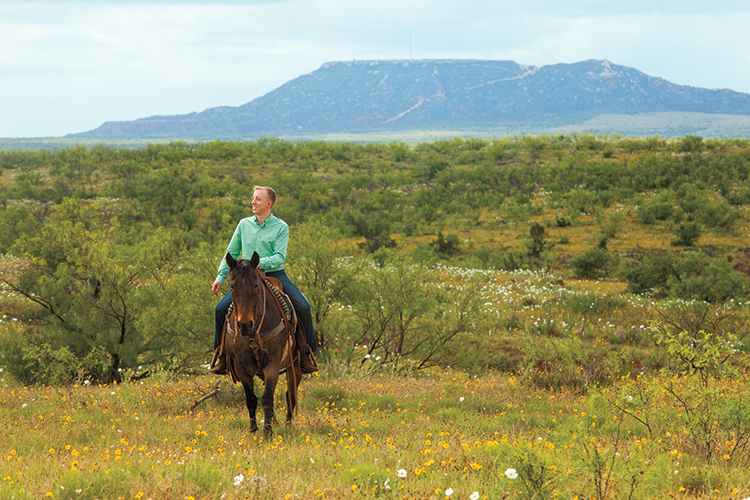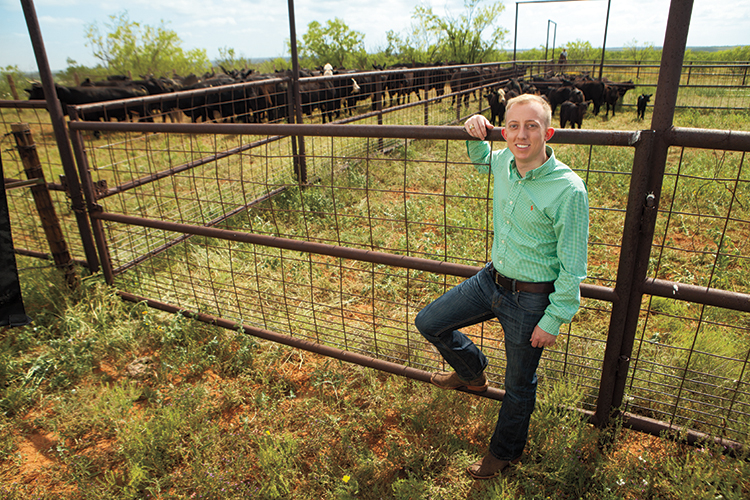Home > Texas > Texas Farm to Table > Keeping the Farm
Keeping the Farm
In partnership with: Texas Department of Agriculture

As a teenager, Riley Branch watched his parents grapple with how they could afford to inherit their family’s ranch with the possibility of an expensive estate tax. Now, the Aspermont, Texas, native is returning to his hometown to practice law and help other families pass on their farms, while continuing his family’s farming tradition.
Every Texas farm and ranch is as unique as the family who stewards the land. No one-size- fits-all formula exists for passing on the farm.
“Each family’s case is different in terms of what the specific needs are,” Branch says.
“Estate taxes also add more complexity,” says Susan Kibbe, executive director for the South Texans’ Property Rights Association (STRPA). “A farm family might be land rich and cash poor. If you have to pay estate tax on higher-valued land, you’re put in a position where you’re forced to sell some of the land to pay the estate tax.”
That was the situation for Branch’s family.
“My grandmother, who owned the ranch, had Alzheimer’s disease,” he says. “She hadn’t done comprehensive estate planning, and our family realized we might have to sell off some of the land to pay the estate tax.”
Fortunately, they developed a plan to retain family ownership of the ranch, which Riley’s father and uncle operate.
The experience marked Riley. ‘“There was so much uncertainty,” he says. “That was the time when becoming an attorney crossed my mind.”
The idea crystallized during college, as he found farm succession a common concern among U.S. farm families during the more than 100,000 miles he traveled as a National FFA western region vice president.
“I realized that as an attorney, I could really help farmers plan for the future,” says Riley, who holds agriculture, business and law degrees from Texas Tech University.

Tax planning isn’t the only concern for farm succession plans, Kibbe says. Water and mineral rights, as well as eminent domain issues around energy and transportation lines, can create complications.
“Eminent domain can split up farms and ranches and inhibit people from keeping their land intact,” Kibbe says.
Higher land valuations in Texas, especially for farms near growing populations, also are a common concern.
“Almost every bit of my land would be salable for development,” says Pearson Knolle, a 73-year-old retired dairyman from Sandia, Texas, located 17 miles from Corpus Christi.
Knolle says his three children would almost certainly owe estate taxes if his land was not designated for agriculture. He’s pleased that his children want the land to stay in farming.
“I’m getting the farm in the best shape possible to pass on,” says Knolle, who has focused his retirement on improving field entrances, pastures and fences. “After I’m gone, it’s up to them to keep it that way.”
In Aspermont, Branch is opening a law office to help clients navigate the legal issues of passing on their farms and ranches. Just starting out, he’ll draw on advice from mentors and other attorneys.
“I’m really proud of the work the attorneys and agriculturists have done to maintain the ability of farming operations to stay intact for the next generation,” he says.
He will farm, too. He’s in a cattle partnership with his father and sister.
“We’ve started with 40 cows, and that’s a tiny herd in Texas,” he says. “I’ve had my time in the fast lane, and I’m really looking forward to returning to the farm to maintain our family’s tradition and way of life.”
That may be the most important reason for policy and plans that favor keeping farms in families.
“The younger generation always seems to come back to the land,” Kibbe says. “The perpetuation of land ownership in families is something that society should cherish and protect.”



